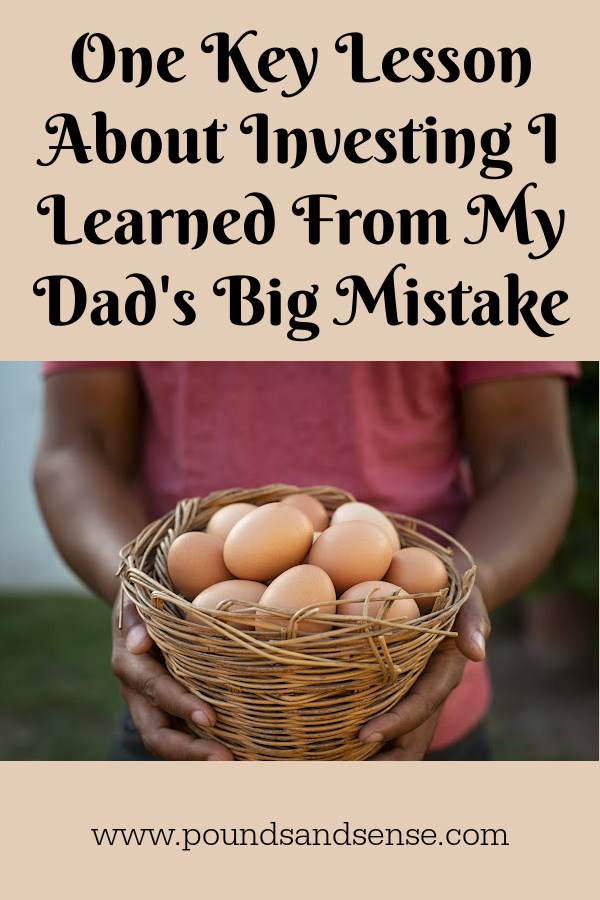One Key Lesson About Investing I Learned From My Dad’s Big Mistake
Let me tell you about my dad. He was a kind, thoughtful man and I learned many important things from him. But money was, sadly, never his strong point.
Here’s an example. Quite a few years ago a family member persuaded him to invest all his spare cash in a media services business a friend of a friend was setting up.
I didn’t hear about this till after the investment had been made. But even though I was much younger then, I could still see it was insanely risky.
It was a new business with no track record. And Dad knew nothing whatsoever about the media – he was a carpet-fitter turned hydraulic machinery salesman. And perhaps sensing that his wife (my stepmother) would disapprove, he didn’t actually bother to tell her about it.
For the next year or so, any time my partner Jayne and I went to visit, Dad would find an opportunity to take us aside at some point to give us an update. Inevitably this would begin with a conspiratorial, “Don’t tell Shirley, but…”
At first the news seemed encouraging, but soon it became clear the business was going south and Dad’s money was going with it. I’ll never know the full story, but it seemed to me he was badly advised (to put it kindly) by the relative concerned and quite probably cheated by the main shareholder, though it was all technically within the law.
Eventually he had to confess to my stepmother that he had lost most of their life savings. This inevitably caused a rift between them and had further ramifications that continued for the rest of their lives.
This whole incident was, of course, deeply traumatic for the whole family. The one good thing it taught me was the folly of putting all your eggs in one basket when investing.
I vowed I would never make that mistake with my own investments and have therefore always aimed to diversify as widely as possible. To date that principle has served me well.
How to Diversify
There is no one single recipe for successfully diversifying your investments, but here are some guidelines I have tried to follow myself.
- Don’t even think about investing until you have paid off any interest-charging debts. You should also have at least three months’ of income in easily accessible form in case of sudden, unexpected emergencies. An instant access cash ISA (see below) might fit the bill.
- Don’t invest more than a small proportion of your portfolio in single company shares. You will get much better diversification by investing in a fund that includes a broad range of shares and other investment products.
- Aim to invest not only across different companies but different countries, sectors, industries, and so on. A well-diversified global fund can do this for you.
- Make full use of your tax-free ISA allowance. This is currently a generous £20,000 a year. Investing via a reputable stocks and shares ISA can save you thousands of pounds in tax.
- For further diversification you might also consider investing a small amount in an Innovative Finance ISA. IFISAs let you invest in peer-to-peer lending. While riskier than bank savings, the potential returns from this are also better. Each year you are allowed to invest in one IFISA as well as one stocks and shares ISA and one cash ISA, as long as you keep within the annual £20,000 limit. [Note: the rule about only investing in one of each type of ISA per year is being abolished from the start of the 2024/25 financial year.]
With a well-diversified portfolio, you greatly improve the chances that if one or more of your investments fails to perform, others will compensate. And whatever happens in the world, your overall investment pot will hopefully build over the years into a substantial sum.
- Whatever you do, though, please don’t make my dad’s mistake and put all your money into a single business (or other investment), especially if it’s one you don’t understand. That really is the fast track to a financial meltdown!
Disclaimer: I am not a qualified financial adviser and nothing in this post should be construed as personal financial advice. All investment carries a risk of loss. You should always do your own ‘due diligence’ before investing and consult a professional financial adviser if in any doubt how best to proceed.
This is an updated version of an article originally published on the Mouthy Money website.

